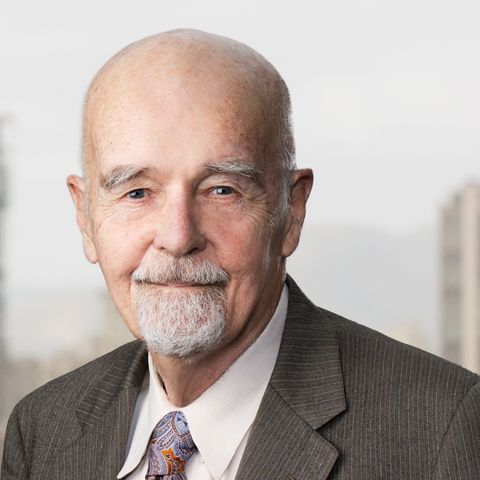James Brosnahan-Justice at Trial

Download and listen anywhere
Download your favorite episodes and enjoy them, wherever you are! Sign up or log in now to access offline listening.
James Brosnahan-Justice at Trial
This is an automatically generated transcript. Please note that complete accuracy is not guaranteed.
Description
For a fascinating, inside look at the criminal justice system and the work of one of America's most prominent trial attorneys, check out this episode with James J. Brosnahan, a...
show moreDuring his career, Brosnahan tried 150 cases ranging from anti-trust to wire fraud and from patent litigation to white collar crime and murder. Some made national headlines, including those that helped provide important First Amendment free speech protections.
Brosnahan recently completed a book on notable trials from his career, "Justice at Trial: Courtroom Battles and Groundbreaking Cases," now available at Amazon and other booksellers.
The interview was conducted by Bob Gatty, host of Lean to the Left and co-host of the Justice Counts podcast and legal thriller author Mark M. Bello, who is Justice Counts host. Here are some questions we discussed with Brosnahan:
MARK: I’d like to talk about Professor Chemerinsky’s forward. I was struck by two comments he makes. I’d like your reaction to them: 1. Practicing law requires hard work and attention to detail-many lawyers work hard. But it also requires creativity. How much of your success is related to hard work and how much to creativity? 2. Professor Chemerinsky talks about the bad rap lawyers get. He points to you as an example of how an ethical lawyer and decent guy can also be highly successful. Can you please talk about being successful and ethical at the same time?
BOB: You were diagnosed with rheumatic fever and a possible heart problem at age 3, confined to bed until you were six. Your connection to the outside world was a radio with Jack Benny and a window overlooking a driveway where you could see kids playing. Did that play a role in shaping the adult you became?
BOB: Tell us about the Secody Murder Trial-you had only been a lawyer for 18 months and you have this major murder trial involving the native American community.
MARK: How does a trial lawyer get a potential juror to admit bias on voir dire?
BOB: You indicate that you were influenced by Cecil Poole, Melvin Beli, and other prominent trial lawyers. You worked under Poole, who was the first African American US Attorney in the United States. Obviously, mentoring was important in your career. Is it still?
BOB: In 1966, you switch sides after how long as a prosecutor? Tell us about the transition from prosecutor to criminal defense and civil plaintiff attorney?
MARK: One of those cases involved representing two young black activists in the Oakland California poverty movement. Tell us about the case. What were they accused of? Why were they prosecuted? And what was the outcome?
BOB: I’m an old newspaper guy. In 1968, at the age of 34, you handled a 1st Amendment case that literally would decide the fate of daily papers in America. Or, was it really an anti-trust case? Tell us about your case and the outcome.
MARK: In 1978, you take another 1st Amendment case, this one centering around the movie Born Innocent, starring Linda Blair of “The Exorcist” fame. The plaintiff attorney argued “People who see movies are inspired to act out what they see,” and argued for censorship. Tell the story of an attempt to prove what you refer to in the book as “negligent imitation.”
BOB: You were a prosecutor—prosecutors have a lot of power in making decision about whether to prosecute or not prosecute, what you call in the book “The Power to Ruin Lives.” How did you deal with the power?
MARK: One of the most interesting cases in the book was Steve Psinakis case. Ronald Reagan is often cited as an example of a so-called “good” Republican president. “President Reagan wanted a conviction of a US citizen as a favor to a corrupt, foreign dictator.” The year is 1986. Tell our listeners the story.
BOB: Another quote from the book: “Preparation for trial requires a complete immersion into other people’s lives while at the same time trying to preserve an objective view of the case.” How does a trial lawyer do that?
MARK: Another quote: “Trial lawyers are essential to enrich democratic reforms and social progress.” Why do you believe that?
BOB: You say: “I have always thought of the United States Supreme Court as the legal conscience of our society.” Do you still feel that way?
MARK: At the request of Lawrence Walsh, the special prosecutor investigating the Iran-Contra affair, you agreed to handle the prosecution of Caspar Weinberger, the US Secretary of Defense under Reagan and Bush one. Before you could try the case, President Bush pardoned Weinberger, an event that caused you “post-pardon depression.” So, how did you really feel?
MARK: The USA PATRIOT Act, mass surveillance of Americans by the federal government, and the transformation of the FBI into an counterterrorism, counterintelligence, and cybersecurity agency happened in the last 21 years or so. Have these changes brought some harm as well as enhanced security?
Information
| Author | Mark M. Bello |
| Organization | Mark M. Bello |
| Website | - |
| Tags |
Copyright 2024 - Spreaker Inc. an iHeartMedia Company

Comments